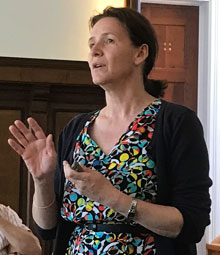
Kathrin Otrel-Cass på CETIS forskarseminarium i Rockelstad 2019.
Why we need to develop critical digital competencies
Text: Kathrin Otrel-Cass
Foto: Katarina Rehder, CETIS
Utdrag ur CETIS nyhetsbrev nr 4, november 2019
Under CETIS forskarseminarium i juni var professor Kathrin Otrel-Cass inbjuden som internationell gäst. Hon berättade om sin forskning kring Trust and the data field child – Technology in the classroom. Vi ställde några frågor till Kathrin om hur hon ser på tillit och på dagens klassrum.
Hur ser vi egentligen på det digitala klassrummet? I dag kanske vi bör omformulera frågan ”vad lärde du dig i skolan i dag?” och istället fråga, ”Vad lärde du dig i världen i dag?”. Klassrummet har blivit en del av den digitala och globala världen och det ställer krav på nya riktlinjer och nya sätt att se på säkerhet och källkritik. Hur mycket kan vi lita på den information vi tar till oss? Här berättar hon om sin forskning.

Kathrin Otrel-Cass
Digital technology in modern society
Technology has always had a profound impact on how people have lived together. In this respect not much has changed between the impact of technology on our lives between then and now. However, the big difference is that in recent times we have developed and used digital technology in very advanced ways to think through, with, and alongside. The relationship with digital technology has impacted profoundly on how we think about ourselves and it has redefined the spaces we inhabit. For example, being online is a space we live in and where we leave our digital footprints. So, the big challenge for us is to think about the consequences of our relationship with digital technology. This thinking also needs to take place in school.
An education for tomorrow
Education systems internationally are demanding for schools to prepare their teachers and students so they can become digitally competent. Emphasis is often placed on the conceptual, procedural and technical competencies. What is underplayed are the societal aspects of digitization. This should include that we develop together with young people the ability to critically review the digital tools we use and the tools that are used on us. In a recent study we conducted www.beyondtechnology.eu we examined together with school children what it means to own and use a phone at home and at school. We discussed how smartphone ownership comes at a price and we looked also into what can be gained when students can share their insights about digital technology in their lives.
Developing critical digital competencies
The developments to do with digital technology in the education sector are exciting as well as concerning. Some technology supports creativity and out-of-the-box thinking while other tools infringe on our rights and those of others. Take for example digital technology that collects information about social and emotional learning. We should raise questions as a teaching and learning community how much 'policing' we should allow to take place in schools. The question here is, if we should not spend just as much time teaching how to miss-trust and respond to digital automation as part of our development in digital competencies?
Digital citizenship education
The new transformations in digital citizenship have to do with understanding not only the advantages and possibilities we can and have gained through digital technologies but also to understand concepts such as surveillance through digital tools. Teachers and students as well as the communities they belong to would gain a lot of insights by examining cases that have gone wrong or are controversial to probe our moral compass to do with digital technology and to examine what is beneficial for us and what not. Developing critical digital competencies will be one of the key assets of the future and since digital technology intersects almost every aspect of our lives it is an aspect that deserves attention in education.
Working with examples
A good example is to examine the digital technologies and resources that are being made available for schools or learning communities (ie Google classroom). Together with children, teachers and parents could think about what the interests are of those who provide these resources and by taking a critical stance we could provide for meaningful discussions that can teach young people about the consequences of using and developing digital technology for any part of our lives.
Digital competencies to understand our own limits
We are living in a time where the biggest challenge will have to do with understanding our own limitations and the consequences of our existence. Spending time with young people to reflect critically on their lives and how digital technology is being used by us and by others is therefore a matter of developing citizenship and democracy. We should be spending time with young people to understand in what way digital technologies impact on how we see ourselves as human beings or how technology impacts on our embodied relations. This means for example how we speak to each other through technology.
Digital technologies have had an empowering and liberating impact on education, when young people are provided with the tools and resources to utilize resources that can expand their minds. At the same time, we can all witness that, if we do not pay attention on how and with what intentions technologies are running in the background of our interactions, we may fail at equipping young people with the ability to learn about the consequences of our digital progress.

